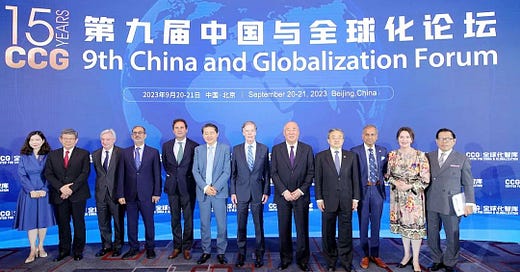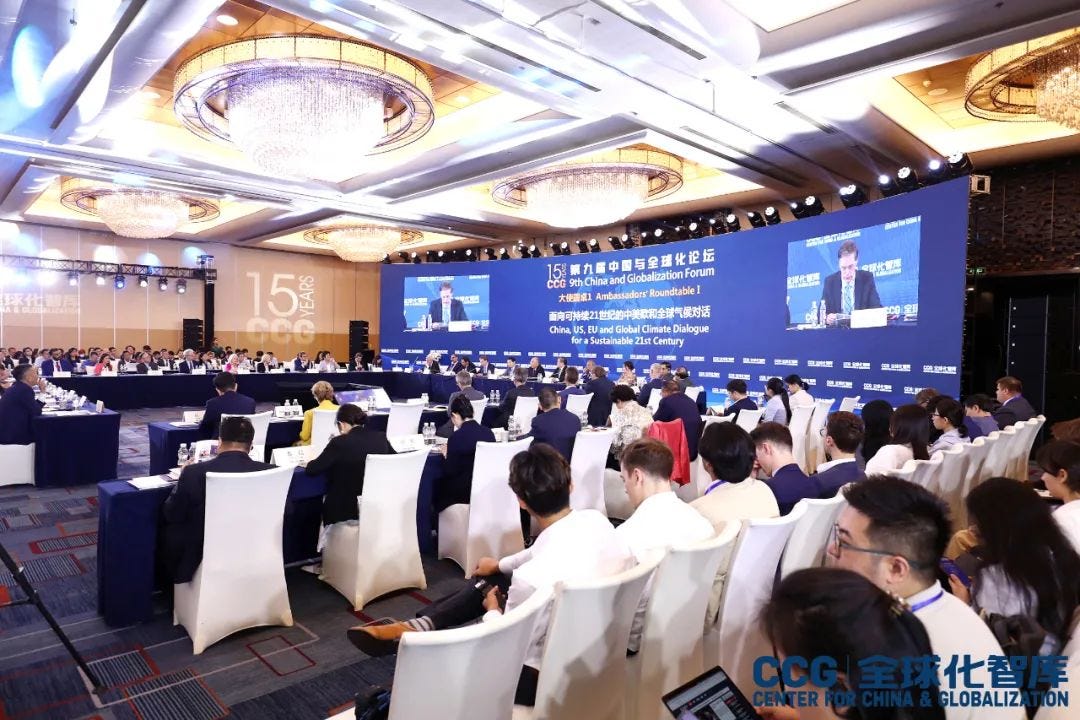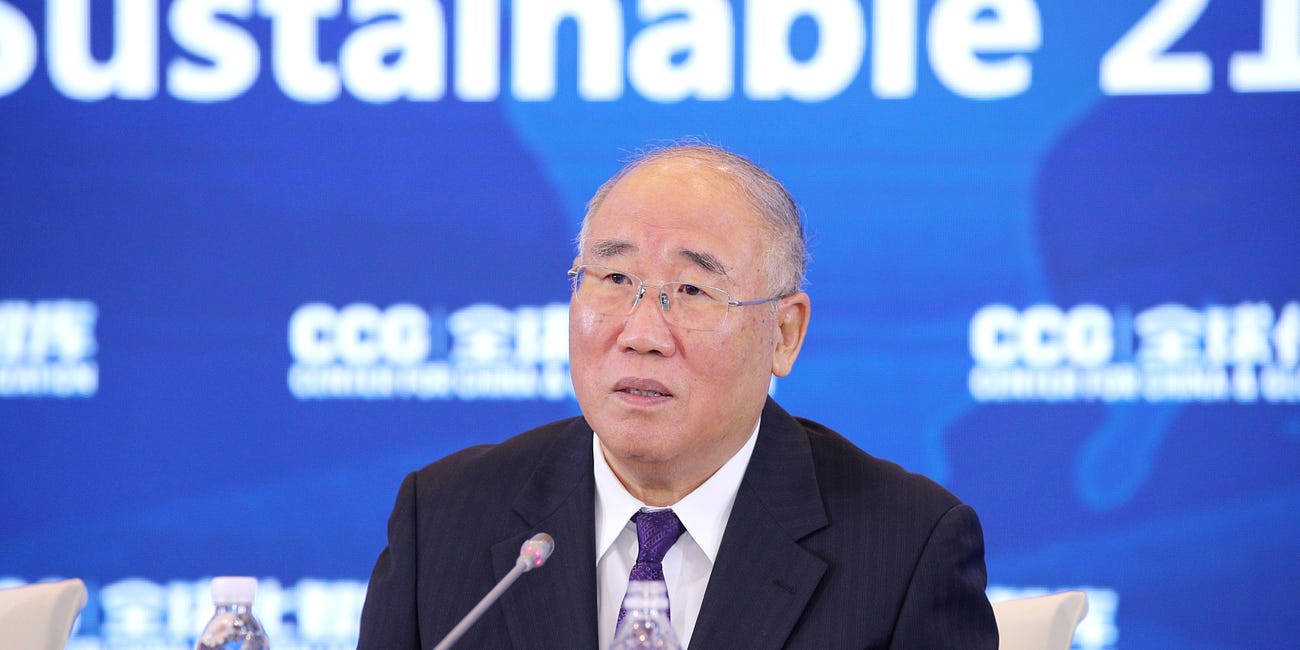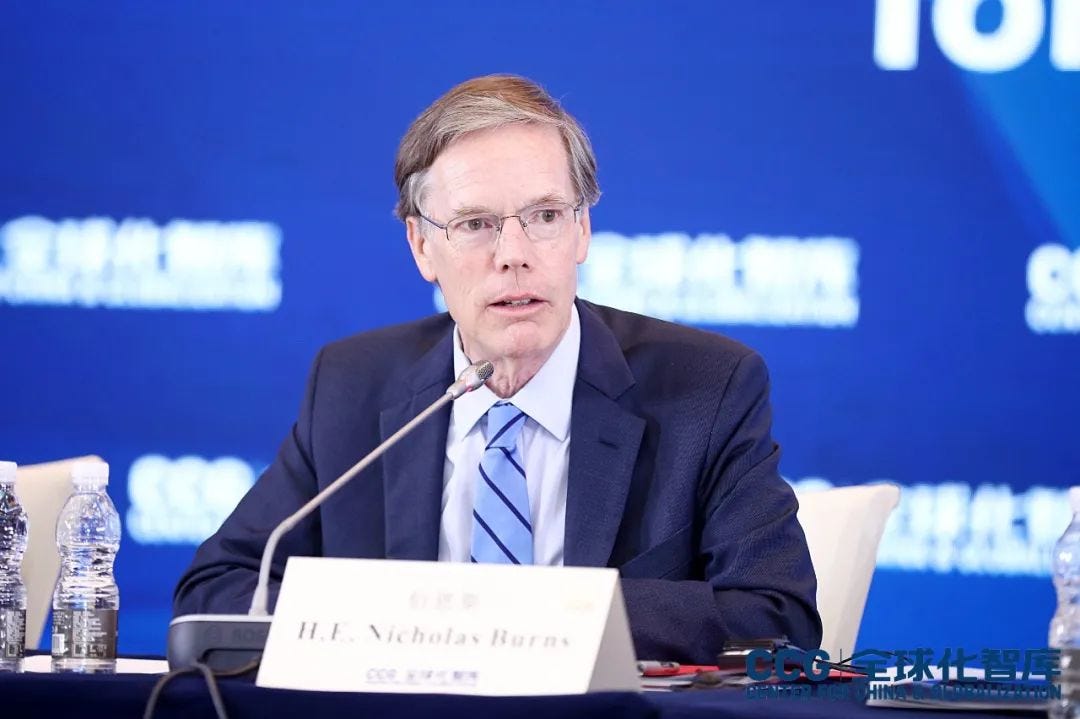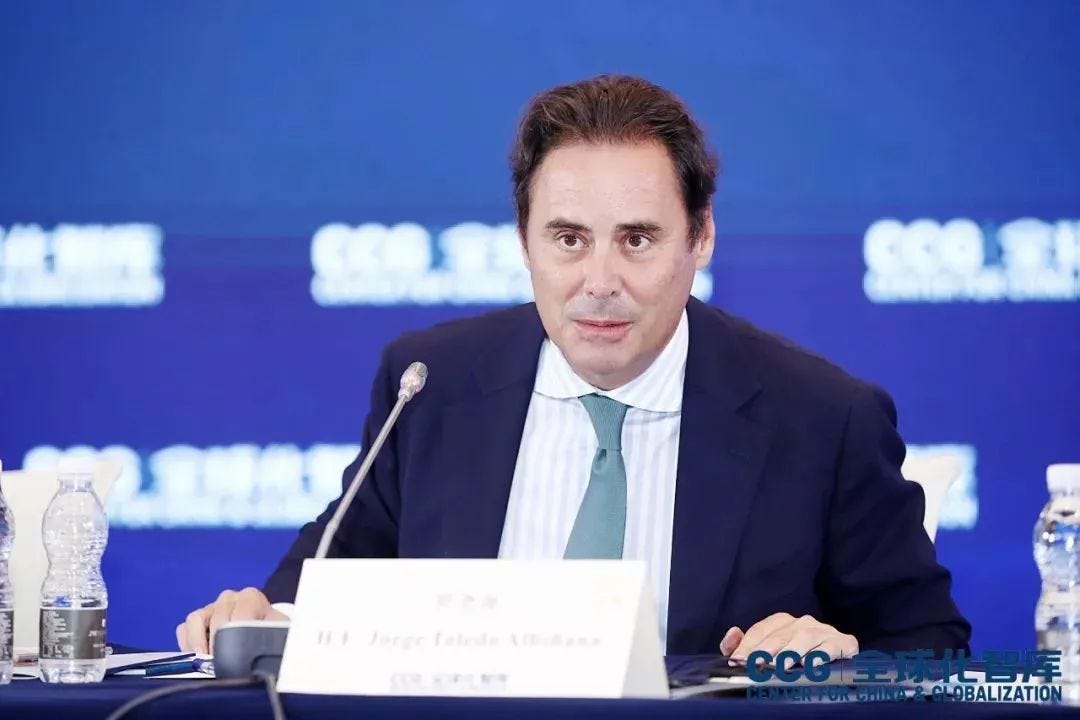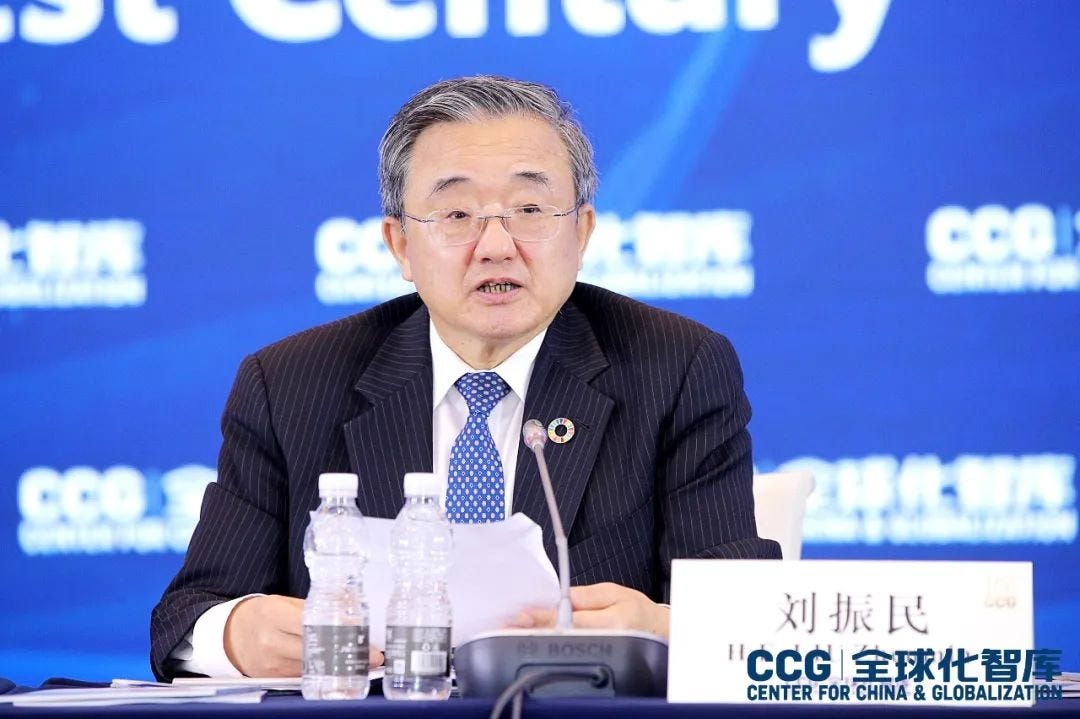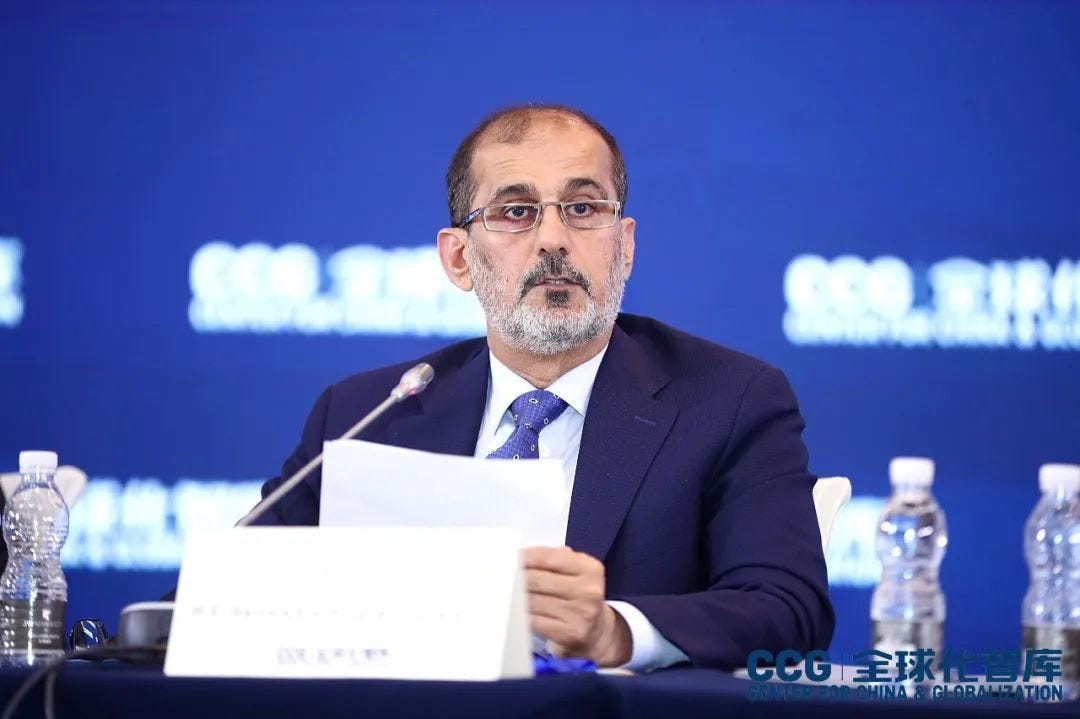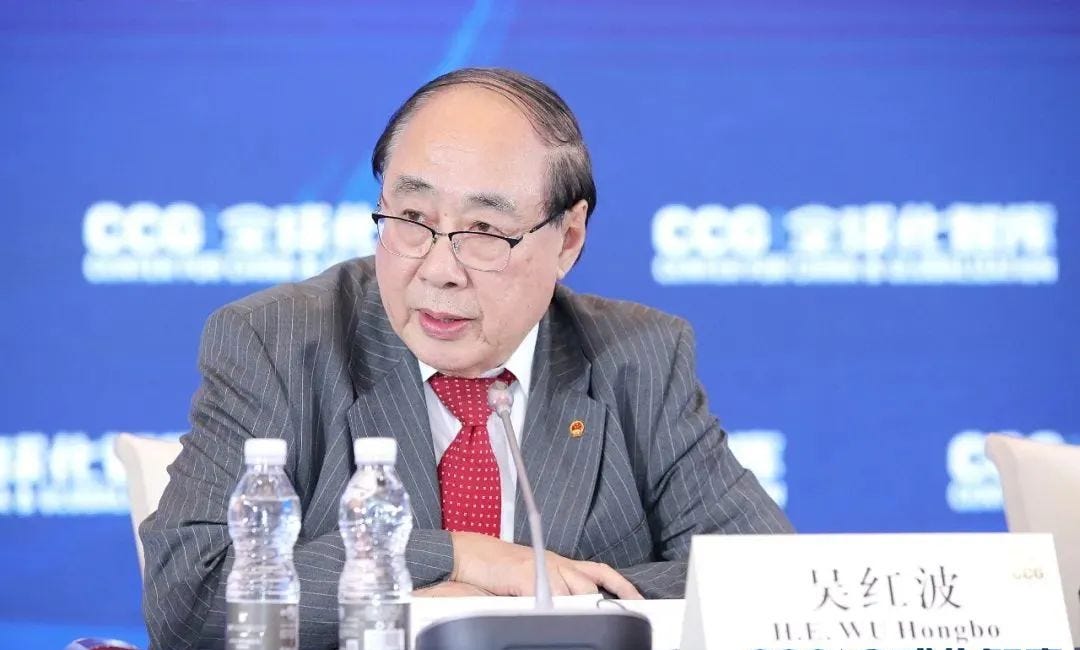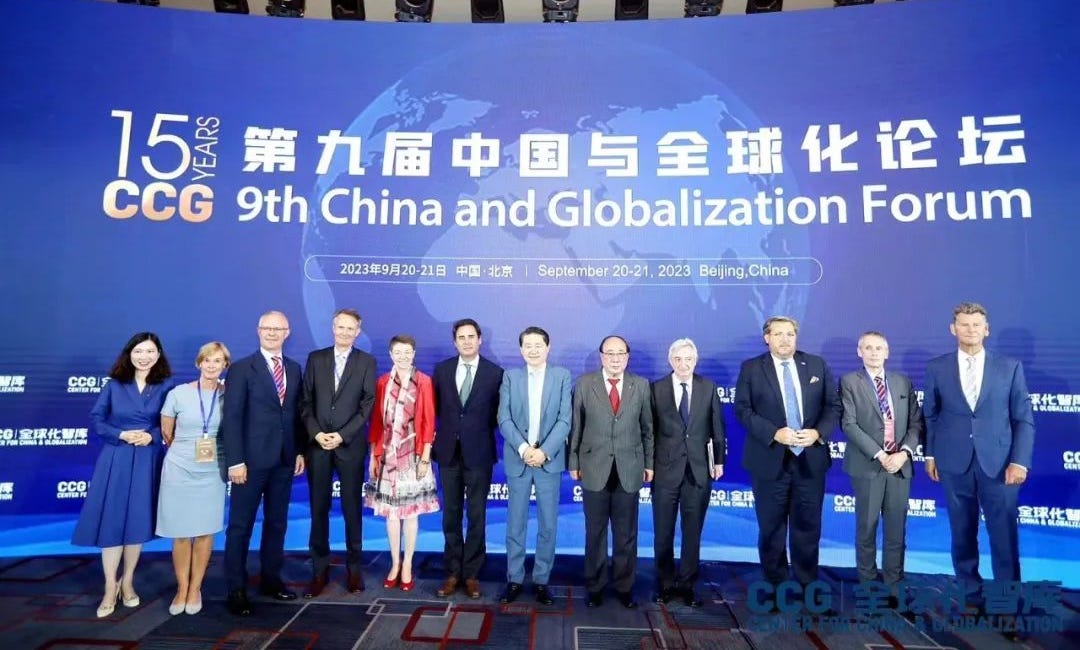Climate change perspectives from the U.S., the EU, China, and the UAE ahead of COP28
Nicholas Burns, Jorge Toledo, Liu Zhenmin, and Hussain bin Ibrahim Al Hammadi spoke at CCG forum.
On September 21, 2023, the 9th China and Globalization Forum, hosted by CCG, brought together Xie Zhenhua, China's Special Envoy for Climate Change, and ambassadors from various countries stationed in Beijing. They convened to discuss critical topics related to climate change, such as mitigation efforts, loss and damage, and climate adaptation. The forum garnered extensive media coverage from Global Times, China Daily, China Review News Agency, Beijing Daily, and Phoenix Television.
Xie's speech has already been published by CCG Update:
See below the speeches by U.S. Ambassador Nicholas Burns, EU Ambassador Jorge Toledo, UAE Ambassador Hussain bin Ibrahim Al Hammadi, and former Vice Foreign Minister of China and former UN Under-Secretary-General Liu Zhenmin. The Chinese translation of their speeches have been published on CCG's WeChat account respectively.
Please note that the following texts are transcripts of live recordings and have not undergone review by the respective speakers or their staff.
Nicholas Burns, the U.S. Ambassador to China
Thank you, President Wang for making this possible. My thanks to Minister Chen and the Center for China and Globalization for this opportunity to speak with all of you. It's a great pleasure to be here with Special Envoy Xie. He is someone who has dedicated his entire life to the environment and to climate change. We have great respect for him. It's a great pleasure to be with my great friend, Ambassador Jorge Toledo, Ambassador Liu, to our UN Resident Coordinator Mr. Chatterjee. And we have the ambassadors from the United Arab Emirates, from Spain, from Slovenia, from Indonesia. And many of our fellow ambassadors from European countries and allied countries are here this morning. It's a very good turnout. So I welcome them all.
We're here today because there's no greater challenge for China, for the United States, for the world than the challenge of climate change. And we've seen the impact just this past summer, unprecedented heat waves, wildfires, flooding, droughts across the globe -- all of them linked, we believe, to the climate crisis. In fact, 2023 was the hottest summer on record, the three month period from June through August surpassing previous records by a quite substantial margin. Last two weeks, we saw an unusually strong Mediterranean storm cause an extraordinary, a catastrophic human tragedy in Libya where thousands of people have died. And unfortunately, for all of us, predictions for the future are even more serious than what we've seen. The United States, China, the European Union, all countries, we’re vulnerable to these changes, we’re victims of the changes, but we’re also authors of our present world and therefore have to take responsibility together for the climate crisis.
We know the data, we know the Intergovernmental Panel on Climate Change findings highlight that to limit warming to 1.5℃, we need rapid, deep, and in most cases, immediate reductions in greenhouse gases. And we need them in this decade.
My friend, the U.S. special Presidential envoy for climate, our former Secretary of state John Kerry pointed out in Nairobi at the Africa Climate Summit just earlier this month, that it is our hope that our two countries, the United States and China, as the two largest economies in the world and the two largest carbon emitters, can now come together and recognize climate change for what it is: It's an existential threat to all of us.
At the United Nations General Assembly just two days ago in New York City, my President, President Joe Biden said that the United States stands ready to work together with China on issues where progress hinge on our common efforts. And nowhere, President Biden said, is that more critical than the accelerating climate crisis. So our two countries need to come together. We have come together successfully in the past. And we believe that we can do so again. We did so in the U.S.-China Joint Glasgow Declaration on Enhancing Climate Action that was achieved in November 2021. We agreed that our two countries would commit to pursue efforts to hold the global average temperature increase to well below 2℃and to pursue efforts to limit it to 1.5℃.
Last November, when President Biden and President Xi Jinping met in Bali in Indonesia, they underscored that our two countries must work together to address all the important transnational challenges, but most notably climate change. And they said at that meeting that they were going to empower the key senior officials not just to maintain communication, but to deepen our constructive efforts. And in that vein, as Minister Xie has said, Secretary Kerry was here in Beijing in the middle part of July. He and Minister Xie, I think, had very good, constructive meetings. They were marathon meetings, as Minister Xie has said -- over 30 hours of them. And during that visit, our two countries committed again that we need to continue our efforts on a productive basis to reach the goals that we've set for each other. This has been an unusual four months in the U.S.-China relationship, but I might say as the American ambassador here: I've been very pleased that Secretary Blinken visited here and met with President Xi Jinping as well as his counterparts in June. Secretary of the Treasury Janet Yellen was here in July. Secretary Kerry was here in mid-July for those very important conversations. Secretary Gina Raimondo was here the end of August to meet with Premier Li Qiang and Commerce Minister Wang Wentao and Vice Premier He Lifeng. Just this past weekend, I was very pleased to join our National Security Adviser Jake Sullivan for two days of conversations in Malta with Foreign Minister and Director Wang Yi.
So You can see that our two countries are making a great effort together to communicate, to deepen our channels, our senior-level channels to try to stabilize. And I think we're making progress on that. A very important relationship for both of our countries and for the world. And at the center of the climate work between us are two individuals: Minister Xie, Special Envoy Xie and John Kerry. I can tell you that they're actively engaged with each other. They have met in person or virtually, are on the phone more than 50 times, and I have great anticipation that they'll be very active working together in the next month or two.
In New York this week, Secretary Kerry also met with Vice President Hang Zhen. They discussed this issue, of climate change. They discussed the imperative of a successful COP28 in the United Arab Emirates. Speaking for the United States, I'm pleased to say that our President Joe Biden has been working very hard to make sure that the United States does what we need to do for our country and to meet our global responsibilities on this issue.
The President said this week in New York, this is an existential threat, and it's been an existential threat from the moment that he took office in January of 2021. President Biden has set a 2030 Nationally Determined Contribution target of reducing America's net greenhouse gas emissions by 50% to 52% from 2005 levels. And we've pledged to reach net zero emissions by 2050 or sooner.
So we hope that all countries will include these economy-wide targets, covering all greenhouse gases in their upcoming Nationally Determined Contributions under the Paris Agreement, as called for by the leaders of the G20 Summit earlier this month.
In addition, President Biden created the first ever National Climate Task Force in our country with more than 25 senior U.S. government leaders and called for putting the climate crisis at the center of United States foreign policy and national security. I've been involved with American diplomacy for 44 years since the Jimmy Carter administration. And I can tell you at no point in the last four decades, has the United States been more committed and done more in our own country to try to live up to our own ambitions and to our responsibilities to every other country. President Biden has led in passing transformative laws in our country, the Inflation Reduction Act and the Bipartisan Infrastructure Law. They are positioning us to cut our emissions in half in the next 7 years by 2030. Inflation Reduction Act is actually America's largest ever investment in clean energy and climate action -- $369 billion. It's projected to deliver 1 billion tons of greenhouse gas reductions by 2030. That's 10 times the climate impact than any other single piece of legislation in my country has ever enacted. This act is actually codified in legislation, passed by our Congress with dedicated funding and incentives to our private sector in the form of tax credits.
Meanwhile, the United States is deploying an all-out effort to partner with nations around the world to reduce global emissions sufficiently, again to reach that 1.5℃ target. For example, we're working together and I'm proud to be sitting with my good friend Jorge Toledo, the European Union and the United States have led the Global Methane Pledge: a coalition of 150 countries launched at COP26 and dedicated to cutting methane emissions at least 30% from2020 levels by 2030. Reducing all greenhouse gases beyond carbon dioxide alone, of course, is essential because non-CO2 greenhouse gases are responsible for half today's global warming.
So together with Norway, we've co-launched the Green Shipping Challenge at COP27. That seeks to reduce global emissions from the shipping sector, a massive source of greenhouse gases. We're also working with many of the countries around the table in the International Civil Aviation Organization along similar lines. But the bottom line is this, and the stark fact is that because China is the world's largest emitter of greenhouse gases, it will be impossible for the world to keep warming to 1.5℃ without enhanced ambition from China. Secretary Kerry has recently pointed out International Energy Agency statistics that imply that if China sticks with its current plan and does not peak emissions until 2030, then the entire rest of the world must go to zero by 2040 or even 2035. And that would be an impossible goal for all of us to meet.
I say this very respectfully because all of us are mindful of the extraordinary efforts and we commend China for this that China has made in renewables, in solar energy, in wind energy, where it’s leading the world. We hope to do some of that ourselves and increasing our own renewable commitment to renewables. But this does mean that we are asking, we hope that China will follow through and build upon the U.S.-China Joint Glasgow Declaration to phase down coal consumption, to develop an ambitious national methane action plan, and to address illegal deforestation. China can help lead the world to success by peaking and starting to reduce emissions during this critical decade.
The other thing that Secretary Kerry has on his mind and he's in New York this week, he wrote an op-ed with Fatih Birol, the IEA Executive Director warning that the proliferation of unabated coal or coal used to produce energy without steps to eliminate emissions, threatens to negate any progress on climate change, such as the recent momentum for the deployment of renewable energy resources. Even if not a single new coal plant were built anywhere in the future, the iIEA has said that the emissions from the world's existing coal fleet, if left unchecked, would be the death blow to the goal of limited global warming to the critical threshold of 1.5℃.
So addressing the climate crisis is important for all of us. It's important for all of us to meet our responsibilities. But I would suggest it’s not just about the United States and China. The world needs and expects every nation to take actions aligned with the1.5℃ goal. And we are here today, I'm here representing my country today, not to lecture, certainly not to dictate any climate action to any nation, but to hope that we can all work together because the science demands that we work together for a better global future. We all must do more because time is passing, as we think about 2030.
I do want to credit the organizers of this conference for bringing us together. I want to credit Minister Xie, a Special Envoy for the extraordinary efforts he is making on behalf of his country, thank the countries around the world who are working with the United States and China. We look forward to COP28, to working productively with China, with the EU, and all the other countries represented at this conference. Mr. Chairman, thank you very much.
Jorge Toledo, the EU Ambassador to China
Thank you very much, dear Henry, a very good friend of mine and of the EU delegation. I must say it is a bit challenging for me to speak today, not only because it's my birthday—59th birthday, but because I have to speak after my good friend, Ambassador Burns and my good friend, Special Envoy Xie, who is one of the leading authorities in climate change, if not THE leading authority in climate change. It’s very challenging.
I'm not going to repeat facts that have been very well described by Ambassador Burns about what's happening and about why it's happening. I have them here, but I'm not going to repeat these facts. I'm going to try and reach some somehow obvious conclusions from these facts.
First of all, climate change is getting worse every year. It has been worse this summer than last summer, and I'm afraid it will be worse next summer than this summer. And this is very bad. Second fact, we have heard from Ambassador Burns what the Sixth Assessment Report by the Intergovernmental Panel on Climate Change is saying. Second fact is we are not doing enough. We are doing things, but we are not doing enough. It's not close enough with what we have to do. And the bottom line of all this is that climate change is not waiting for us. It's happening under our watch.
Why is this happening? Maybe one of the first things we have to address is that although we have a kind of informal governance system, or informal governance structure under the Paris Agreement, we need to reinforce this structure. We need to reinforce not only, as Special Envoy Xie emphasized, the implementation and the accountability, but we have to augment our ambition because with what we agreed and the implementation of it, we are not doing enough.
I'm representing the European Union here and there are close watch of some of my important member states. I must say that unfortunately, the European Union is one of the three largest emitters of greenhouse gases. Climate change is caused by these. But the European union, the United States of America, and China are the three largest emitters of greenhouse gases. We know that. I'm not going to name names and the order in which we emit gases. Now let me say that in per capita emissions, the European Union is now already at the global average, which I'm afraid is not the case with China and the U.S. But we are all struggling to reduce.
The European union will be below global average per capita emission in 2030. And this is a law in the European Union. In the European Union, we have been reducing our emissions since before the Kyoto Protocol was signed but with increasing speed since 2005. And I must say with increasing speed, with some of the most important and serious challenges to the fight against climate change, which is the Russian aggression to Ukraine, which has caused, as you know, an energy crisis.
Again, although Mr. Putin wanted us to freeze in Europe, we have not frozen. And not only have we not frozen, but we have increased our ambition to move from fossil fuels to renewable energy. In the European Union, we remained committed to the objectives of the Paris Agreement. We want to increase, we are increasing, we have increased our ambition. We have agreed that by 2030, we would have reduced our emissions by at least 55% compared to 1990 levels. That will put us leading the global effort.
So what can we do apart from strengthening the governance of the fight against climate change? It's to be exemplary in everything, including implementation but also ambition.
One thing we have done in the European Union, which is working extremely well, and the example of which we would like to see spread around the world is something a bit controversial here and somewhere else, is called carbon pricing.
Our experience in carbon pricing shows that it has been the most cost-effective policy to cut greenhouse gas emissions. And where robust carbon markets have been implemented, they have delivered emission reductions through behavioral and technological change, and they have accelerated innovation—all of them ambitious targets of the Paris Agreement. It has also raised revenue for the green transition. For instance, as an example of the success of carbon prices, industry (which) is responsible for about 40% of our greenhouse emissions that are subject to carbon prices have drastically reduced their emissions. We have established a cap and under this cap, the emissions can be traded. Cap and trade is the name of the game. And since 2005, emissions of the industries covered by the cap and trade have come down already around 35%. This gap, by the way, is decreasing by 4.3% every year. Besides, the EU emissions trading system has raised already more than 140 billion euros in revenues.
As you know, China is developing a similar system and we are trying to help and cooperate with China to establish and widen this system. We strongly believe it is the way to go. And let me say one thing about something which is more controversial, which is the Carbon Border Adjustment Mechanism or CBAM. And let me be very clear: CBAM is a fact. It will come in 2027. It will be effective. We're going to try to start very soon putting it in practice as a trial.
But let me be very clear: CBAM is not at all about protectionism. CBAM is only exclusively about reducing greenhouse emissions because there is no way we can do anything useful by having our industries pay a high price for the carbon emissions. If they can avoid it, going somewhere else where they can avoid this carbon pricing, it is called carbon leakage. So by establishing this CBAM system, we are contributing—and this is the exclusive target of this system—we are contributing to the fight against climate change.
So you see in the EU although, among the three blocks here represented, we are the lowest per capita emitter, we are not proud of it because we want to reduce it further. And we are convinced and we are going to do it, that we need to do more, and faster than others. And we will become the world's first net zero continent by 2050.
So as I said before, implementation, and I agree with Special Envoy Xie is important, is essential. But as we saw, it's not enough. We need more ambition. We need exemplarity. That's why Vice President Zimmerman, a good friend of Special Envoy Xie insisted in our recent high-level dialogue on environment and climate change that China raises its ambition. We know that when it comes to the deployment of renewables, China will be far ahead their commitments in renewables. We encouraged China to say it because it would set an example and they have a very good opportunity now in COP28.
Vice President Zimmerman also raised his concern to Special Envoy Xie and in the high-level dialogue, we have concerns about China opening recently and having plans to open new coal fired power plants because it will have a bad impact over the long term on its decarbonization pathway.
I must say, in this respect, that we were faced with a grave serious crisis because of the Russian attack on Ukraine: our supply of natural gas was cut. One of the options would have been to build more coal power plants. We took a deliberate decision not to do that. And I must say that we have not built a single coal power plant in the last 10 years in the European Union. We are closing them down.
Methane, as Ambassador Burns said, is a huge challenge, and the U.S. along with the EU and others have signed the Methane Pledge. I would only repeat Ambassador Burns' words by encouraging China to join us because this is of extraordinary importance.
Cooperation—cooperation with China, cooperation with the U.S. As you know, we describe our relation with China as one of partnership, competition and systemic rivalry. Well, the best example of partnership is the fight against climate change. As Premier Li Qiang said, when President von der Leyen was here in April, green is the color of our cooperation.
So what do we do about the COP that's coming? Indeed, the EU, China, and the U.S. can play a role of deal makers for governance. This is not about creating a G3 that would decide instead of the others. But this is about creating a G3 as an example, as being exemplary, as driving the ambition, as showing that we are the most committed.
The United Arab Emirates presidency has given us already a clear sense of direction and an injection of political momentum with the global stocktake, which should become key milestone for enhancing ambitious climate action in the coming years. It is essential that governments and the three of us, in particular, respond with concrete, ambitious commitments to this challenge.
The global stocktake needs to be able to inform and shape the next round of Nationally Determined Contributions by 2025. COP28 needs action. It should reflect our call for action and stress that in order to keep the 1.5 goal within reach, we must peak global greenhouse gases emissions before 2025 at the latest and reduce them at least by 43% by 2030, 60% by 2035 and 84% by 2040 versus 2019 levels. As you have already heard from me, we are going to lead this ambition.
But along increased ambition, we need to demonstrate progress in implementing mitigation action, as Special Envoy Xie talked to us about that. We need all parties and particularly major economies as ours to implement a Nationally Determined Contribution, but also to strive to include all greenhouse gases and sectors in them.
On loss and damage. Finally, the EU and its member states are engaging in this process constructively to ensure an outcome that comprises all key elements outlined in the Sharm el-Sheikh Decision. In particular, we see the need for recommendation to explicitly target countries and its communities that are particularly vulnerable to the adverse effects of climate change, such as least developed countries and small island development states, while also paying attention to building long-term resilience against the adverse effects of climate change. And let me also be very clear. We need everybody, including China, contribute to mitigation, especially for least developed and developing countries. Thank you very much for your attention.
Liu Zhenmin, former Vice Foreign Minister and former Under-Secretary-General of the United Nations
Just a moment ago, Director Xie Zhenhua, Ambassador Burns, and Ambassador Toledo delivered their keynote speeches. These three speeches were quite informative, sharing a wealth of information and raising important questions. Of course, their speeches also underscored the ongoing challenges we face in dealing with climate change.
I can personally relate to these challenges, having been involved in international efforts to address climate change for many years, from COP2 to COP5. And as the head of the Chinese delegation, I participated in climate change negotiations, including those related to the Kyoto Protocol. Additionally, during my six years as Assistant Minister and Deputy Minister of Foreign Affairs, I attended six local conferences, including negotiations on the Paris Agreement, alongside Director Xie Zhenhua.
After taking on the position of Under-Secretary-General of the United Nations Department of Economic and Social Affairs (UN DESA) in July 2017, I continued to be actively involved in climate change discussions. Besides accompanying Secretary-General Guterres to climate change conferences each year, I have also been pondering how to integrate climate change with our efforts to promote sustainable development.
As a result, I led my colleagues at the UN DESA in combining our work on the implementation of the 2030 Agenda and the Sustainable Development Goals with the issue of climate change. Over the years, we organized significant events such as the United Nations High-level Dialogue on Energy in 2019, the second United Nations Sustainable Transport Conference in 2021, and the second United Nations Ocean Conference in 2022. Additionally, we have organized various other forums and conferences related to climate change, forest conservation, and sustainable water resource utilization. Through these activities, we have made it clear to countries around the world that achieving sustainable development and addressing climate change are closely intertwined.
We have emphasized that addressing climate change is not only the responsibility of governments but also the duty of every citizen. Since returning to Beijing after my tenure as UN Under-Secretary-General for Economic and Social Affairs more than 13 months ago, I have been closely monitoring climate change issues daily. It is disheartening to observe that 2023 has been marked by an increasing number of extreme weather events worldwide. 2023 might be one of the hottest years in human history, as Secretary-General Guterres warned in early September that climate collapse has already begun. I share Secretary-General Guterres' viewpoint that while we can still prevent the worst-case scenario, urgent action is required. I take this opportunity to share some personal insights and recommendations.
First, countries should expedite their actions and effectively implement the Paris Agreement. Currently, 148 countries have submitted carbon neutrality targets. Accelerating the implementation of Nationally Determined Contributions by all parties to achieve the goals of controlling global temperature rise as outlined in the Paris Agreement will yield positive results. I concur with Director Xie Zhenhua's view that humanity must take proactive action to address climate change and maintain confidence. Through proactive green transformation and the development of a low-carbon economy, we can further mitigate the effects of climate change.
Second, countries should prioritize practical actions on climate change. Climate change is now irreversible. As Ambassador Toledo mentioned earlier, climate change is actually worsening, and I share this perspective. Human mitigation efforts can only control the extent of adverse impacts of climate change and prevent the worst outcomes. In fact, the United Nations Framework Convention on Climate Change signed in 1992 designed a dual-track approach for addressing climate change, encompassing mitigation and adaptation measures. Given the increasingly adverse impacts of climate change, adaptation efforts by countries should also accelerate. I also support Director Xie Zhenhua's suggestion that the COP28 should make decisions on climate adaptation.
Third, countries should make sincere efforts to assist developing countries in addressing climate change, especially the least developed countries, small island developing states, and African nations. Developed countries should effectively fulfill the commitment made at the Copenhagen Conference to provide $100 billion in financial assistance annually to developing countries. Regrettably, this commitment has not been effectively fulfilled. Developed countries and capable developing countries, including China, should continue to provide assistance to relevant developing countries through South-South cooperation.
Fourth, countries should prioritize both intergovernmental and market cooperation in addressing climate change. Measures that disrupt market-based project cooperation, such as export restrictions, should be avoided by relevant countries. Reflecting on the 31-year history of the United Nations Framework Convention on Climate Change, there have been painful lessons in this regard.
To be frank, if developed countries had started technical cooperation and low-carbon development cooperation on climate change with developing countries in the 1990s, the global effectiveness of addressing climate change today would have been much better. Unfortunately, cooperation in this regard still falls short. Countries should learn from these lessons and strive to avoid geopolitical disputes that disrupt international cooperation on climate change.
Ladies and gentlemen, the effectiveness of addressing climate change will shape the future of human development. The United States, the European Union, and China are the three largest economies, each with its unique national conditions, development stages, and historical responsibilities regarding climate change. However, as the world's three largest economies, accounting for more than 60% of the world's total GDP, they should uphold their tradition of cooperation, find common ground while acknowledging differences, and continue to enhance cooperation in addressing climate change. They should lead international cooperation on climate change and make continuous progress. Thank you all.
Hussain bin Ibrahim Al Hammadi, Ambassador of the United Arab Emirates to China
Ladies and gentlemen, distinguished guests, it's truly an honor to be here today in this ambassadors' round table representing the United Arab Emirates. I would like to share with you some critical update regarding the COP28, which will soon be held in Dubai Expo City and discuss the significant role, its place addressing the global climate crisis.
In August 2022, we were like 100 days away from the COP28 countdown. It's going to be the world's largest annual climate summit that will shape a global climate action. COP 28 will be the UAE's, if not global, stocktake, as was mentioned by the Ambassador, a comprehensive evaluation of the progress against the goal and ambition set out in the Paris Agreement at COP21. COP28 is set to welcome over 70,000 representatives, including world leaders, NGOs, private sectors representatives, indigenous people, and young people.
To guide our effort, the COP28 presidency has set out four pillars. First of all is the fast-tracking in the energy transition. COP28 aims to facilitate an orderly, just, and educated energy transition that empowers climate positive development, particularly in the Global South.
The second is fixing climate finance. Finance plays a vivid role in enabling effective climate action.
The third pillar is focusing on people, lives, and livelihood. COP28 recognizes the urgent need of investing people and nature to address the impact of climate change and will focus on enhanced adaptation, build resilience and support sustainable development, including addressing loss and damage.
Last but not least is underpinning everything with full inclusivity. Inclusivity is the core of COP28. We will collaborate with diverse groups including youth, indigenous people, and local community, ensuring their contributions are integrated into all aspects of COP28, with the commitment to a safe and harassment-free environment for all delegates. COP28 is not just another conference. It is a crucial moment to unite, act, and deliver, to shape our clear future.
In 2023, the UAE has declared the "Year of Sustainability: Today for Tomorrow," showcasing UAE's rooted value of sustainability and emphasizing responsible consumption, conservation, and joint effort against climate change and other pressing issue related to sustainability. This nationwide initiative calls for everyone's action today aiming for a greener tomorrow and underscores the importance of collective action. In addition, reports are being made to bridge the generational gap between youth and senior citizens through a series of intergenerational dialogue during COP28 on key climate issues. The goal is to empower youth in the UAE and beyond by providing them a platform to voice their perspective on climate change and action.
In this regard, the upcoming 18th edition of the Conference of Youth in November ahead of the COP28, once again, recognizes the potential fuels to drive positive change and climate action. Moreover, we recognize China has played an indispensable role in building resilience and some of the world's most revised country as a prominent logistic hub for China, Belt and Road Initiative. The UAE understand the importance of international development and infrastructure modernization in mitigating the effect of climate change.
Lastly, I would like to highlight an initiative led by the Environmental Agency of Abu Dhabi, "Ghars Al Emarat." The UAE is planning an initiative that will see ten mangrove trees planted for each conference visitor of COP28. This initiative not only supports climate action but also highlights the importance of preserving our natural ecosystem.
In conclusion, COP28 UAE is a unique opportunity for the world to come together, unite, and act. We invite you all to join us in this historical endeavor. And together we can share a greener, healthier, and more resilient world. Thank you very much.
Check out other posts by CCG Update on the 9th China and Globalization Forum:

